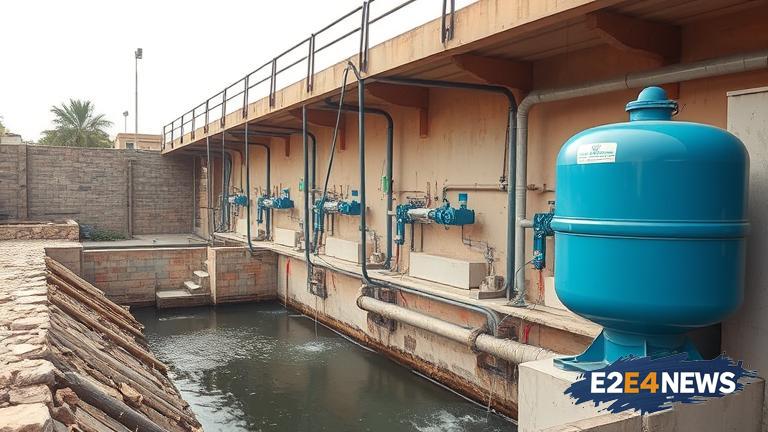The government of Pakistan has announced plans to enhance wastewater treatment in Lahore, the country’s second-largest city, by introducing advanced filtration systems. This move is expected to significantly improve the water quality in the city, reducing the risk of waterborne diseases and environmental pollution. The new filtration systems will be designed to remove pollutants and contaminants from the wastewater, making it safer for discharge into water bodies. The project is part of a broader effort to improve the city’s sanitation and hygiene infrastructure, with a focus on protecting public health and the environment. The wastewater treatment plants in Lahore will be upgraded to include advanced filtration systems, such as membrane bioreactors and activated carbon filters, which will enable the removal of a wide range of pollutants, including heavy metals, pesticides, and other harmful substances. The project will also involve the construction of new wastewater treatment plants in several districts of Lahore, which will increase the city’s wastewater treatment capacity and reduce the amount of untreated wastewater discharged into water bodies. The government has allocated significant funds for the project, which is expected to be completed within the next two years. The project will be implemented in collaboration with international organizations and private sector companies, which will provide technical expertise and financing. The introduction of advanced filtration systems in Lahore’s wastewater treatment plants is expected to have a significant impact on the city’s environment and public health. The improved water quality will reduce the risk of waterborne diseases, such as cholera, typhoid, and diarrhea, which are common in areas with poor sanitation and hygiene. The project will also help to protect the city’s water bodies, including the Ravi River, which is a major source of water for irrigation and drinking. The government’s efforts to improve wastewater treatment in Lahore are part of a broader strategy to address the country’s water and sanitation challenges. Pakistan is facing significant water scarcity and sanitation challenges, with many cities and towns lacking access to safe drinking water and proper sanitation facilities. The government has launched several initiatives to address these challenges, including the construction of new water treatment plants, the rehabilitation of existing infrastructure, and the promotion of water conservation practices. The introduction of advanced filtration systems in Lahore’s wastewater treatment plants is a significant step towards addressing the city’s water and sanitation challenges. The project will not only improve the city’s water quality but also help to reduce the environmental impact of wastewater discharge. The government’s efforts to improve wastewater treatment in Lahore are expected to have a positive impact on the city’s economy and public health. The improved water quality will attract businesses and investments, creating jobs and stimulating economic growth. The project will also help to reduce the burden on the city’s healthcare system, which is currently struggling to cope with the high incidence of waterborne diseases. The government’s plans to enhance wastewater treatment in Lahore have been welcomed by environmentalists and public health experts, who have long been advocating for improved sanitation and hygiene infrastructure in the city. The project is a significant step towards achieving the United Nations’ Sustainable Development Goals (SDGs), which include ensuring access to safe drinking water and proper sanitation for all. The introduction of advanced filtration systems in Lahore’s wastewater treatment plants is a testament to the government’s commitment to addressing the country’s water and sanitation challenges. The project will serve as a model for other cities in Pakistan, which are facing similar water and sanitation challenges. The government’s efforts to improve wastewater treatment in Lahore will have a lasting impact on the city’s environment and public health, and will contribute to the country’s overall development and prosperity.
